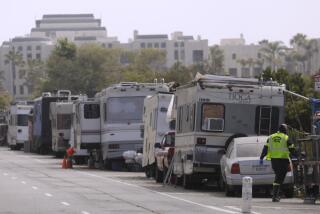Tourism is tanking. So RV and camper companies found business fighting COVID-19
Elise Ballard had just finished lunch and was gazing at the Pacific Ocean, enjoying the solitude of the craggy coastal bluffs of Mendocino, Calif. Soon, she and partner Jeff Fernald would be on Highway 1 again, continuing home to Seattle in a rental camper van they’ve dubbed the “mobile quarantine unit.”
“It’s so uncanny; it’s so strange,” Ballard said Monday. “We are seeing some of the most beautiful sites in the world — and they are vacant. It feels like one of the safest places to be.”
The couple’s journey in the Mercedes-Benz Metris began six days earlier, after their Los Angeles vacation was upended by the coronavirus outbreak. They didn’t want to risk flying home and realized renting a car could put them in contact with many people, including those at hotels where they’d need to stay. But they could sleep in the Metris, which also has a stove, refrigerator and freezer.
So Ballard and Fernald extended their rental with Silver Lake-based Texino, a boutique camper van company with whom they’d already rented the vehicle for their vacation. They’re taking their time — Ballard said the trip could stretch into April — in part because they worry about returning to Seattle, a focal point of the pandemic.
“This van,” she said, “has become such a safe little bunker.”
As the coronavirus outbreak spreads, recreational-vehicle companies — those that rent or sell RVs, camper vans and motor coaches — are adapting to a veritable wartime economy. Operators said they’ve seen much of their business dry up, aside from travelers seeking to avoid airports. But some have turned to a secondary area, serving government and other large clients. In many cases they are providing RVs for key workers, such as medical personnel, who require lodging that keeps them away from home, where they could pick up the virus that causes COVID-19 or spread it to others.
“We’ve had a number of counties, cities, states and government entities reach out to us and say, ‘We have a need for social distancing accommodations, can you help us do this?’” said Gordon Hewston, senior vice president at Tourism Holdings Ltd., the New Zealand-based parent of El Monte RV, one of the biggest RV sales and leasing companies in the country. “It gives us an opportunity to serve the community, help save America from the virus, and keep our people in jobs.”
Even in a time of travel restrictions, national RV companies are also still getting some traditional bookings — mostly from people with urgent travel needs. Such business comes, however, at a time when it is advised that Americans remain home, both for their own health and that of others, so as to not strain the medical systems of the places they pass through or visit. It also remains an open question as to whether RV sales and leasing firms qualify as essential operations that should remain open amid the shuttering of most businesses across many states. Texino, in fact, closed March 20 to comply with the city of Los Angeles’ advisory that nonessential businesses shut down.
And yet, amid the pandemic, RVs remain uniquely appealing for pressing long-haul trips because, unlike most camper vans and many other modes of transportation, they are typically equipped with restrooms, making it easier to use them and practice physical distancing.
As a result, El Monte and another national company, Cruise America, are seeing an uptick in rentals for one-way trips from customers who don’t want to fly but need to travel, including people returning home from college or a period of working remotely.
At Cruise America, such activity is up “tenfold,” said Michael Smalley, a senior vice president at the company. He attributed that to the reach of Cruise America, which along with sister company Cruise Canada has 130 locations in North America.
“There is a big need for a lot of people to still be transported, especially the vulnerable,” Smalley said. “We are one of the few companies in America that provide a vehicle that is contained to go from one place to another.”
However, this sort of activity is not making up for the loss of business brought on by the total collapse of tourism, which is the lifeblood of RV companies and the like, representatives of several firms said.
Spring is an important time for leisure transportation firms, with throngs of tourists — overseas and domestic ones — road-tripping to national parks and other sites. Now, though, vehicles that once would’ve been headed for Yosemite National Park or Mt. Rushmore are being rented for anxious retrievals of elderly relatives from far-flung locales and other fretful trips.
An untold number of Americans are now traveling in recreational vehicles on near-empty interstates, country lanes and expressways — strange journeys that bring to mind Cormac McCarthy’s “The Road,” the Pulitzer Prize-winning novel about a father-son journey across a post-apocalyptic country.
“We experienced that San Francisco felt really weird,” said Ballard, 48, a marketing consultant. “So we are just trying to stay in the most remote places possible.”
Pivot to commercial business
This isn’t the first time companies such as El Monte and Cruise America have pivoted to service the needs of governments and other larger entities facing a crisis. During natural disasters such as Hurricane Katrina and the Northridge earthquake, and in the aftermath of the 9/11 terrorist attacks, big RV rental companies have seen spikes in business from such customers.
But none of those cataclysms had the scale and duration of this pandemic.
Cruise America, the biggest RV sales and rental outfit in the U.S., is currently renting about 100 RVs from its fleet of about 3,700 vehicles for commercial uses. A “substantial portion” of those are for government entities, businesses and medical centers — including the Mayo Clinic — that are responding to or dealing with the threat of the coronavirus, said Randall Smalley II, an assistant vice president at the Mesa, Ariz., company and cousin of Michael Smalley.
In the case of the Mayo Clinic, the Scottsdale, Ariz., branch of the medical organization rented an RV from Cruise America in mid-March to use in conjunction with a drive-through coronavirus testing operation, Michael Smalley said.
“Our vehicle is there for staff to get out of the elements,” he said.
Santa Fe Springs, Calif.-based El Monte, which has a fleet of 2,000 vehicles, has rented about 200 of them to government entities fighting the pandemic, Hewston said.
In addition to those rentals, about 50 other El Monte RVs are being used by water, power and other utilities that want certain essential employees to remain on site to oversee continued operations. “They don’t want them going home and catching the disease,” he said.
Unique bookings, unique circumstances
To meet the health challenges of the coronavirus, recreational-vehicle companies are instituting stringent cleaning programs and implementing safeguards for customers visiting dealerships and rental facilities.
For Cruise America, that meant waiving a $35-to-$55 fee that is charged to handle the removal of an RV’s on-board wastewater upon return of the vehicle — a task that may increasingly fall to the company if customers are disinclined to deal with sanitation issues.
Efforts like that could give comfort to one-way RV travelers and others making specialty bookings, some of whom could be renting an RV for the first time and doing so under difficult circumstances.
On the high-end side of the recreational-vehicle business, Goss RV, a sales and rental company, has also seen an increase in one-way travel. According to Philip Lee, sales manager at the company’s Atlanta headquarters, roughly 90% of recent requests have been for “immediate one-way travel.”
“A lot of people want to get home, but they feel like they are stuck,” said Lee, whose company has a fleet of 105 vehicles for rent. “They don’t want to go through the airports, they don’t feel safe doing that.”
Goss’ motor coaches — which cost more than $750,000 — start at $12,500 for a weeklong rental of a 45-foot vehicle, Lee said.
That price — or more — will get you a motor coach (think: the tour bus of a huge rock star) with amenities such as a fireplace, washer and dryer, a master bedroom, multiple bathrooms and more. And for a fee, the company will provide a driver, Lee said.
With the precarious state of things, Goss’ customers “feel this is the best way,” he said.
There’s even been a new business category emerging: customers who need to be isolated but remain close to home. Both Cruise America and El Monte said they have fielded calls from people looking to rent a vehicle and park it at their residence. Hewston said some of these rentals have been for ill family members.
“We’ve also had bookings for self-isolation, [for] people who have got the virus but aren’t sick enough to go to hospital,” he said. “They can still talk to family from a distance.”
Quasi-leisure trips
In the earlier stages of the outbreak’s sweep across the U.S., people from California and beyond turned to the wilderness as an escape. From Feb. 1 to March 11, for example, camping reservations at California State Parks were up 77% compared with the same period a year ago.
However, the state park system announced a temporary closure of all campgrounds on March 17 to help in the fight against the coronavirus. And many other state and national parks are now shut down, too.
Those closures, and local and state orders requiring people to stay at home for everything but nonessential endeavors, have disrupted the travel plans of many who planned RV adventures. They’ve also disrupted the businesses of some, including now-closed Texino.
Still, some people looking for an escape have managed to get one, including Mid-City resident Bradford Smith.
He and girlfriend Em Frederick had a long-planned trip to Big Sur in a Texino camper van on the calendar for March 18. But as the panic spread, he wondered if he should cancel. Ultimately, they went on the trip, thinking it would give them the chance to practice physical distancing and get a “sanity check.”
However, when Smith and Frederick telephoned from the road to confirm their reservation at a state campground, they learned it was closed. But they were able to spend the night at Fernwood Campground and Resort, a private facility. They returned to a very different version of L.A. on Sunday, dropping off their rented Metris to a company that closed days earlier. Now, Smith worries about the fate of Texino and others like it.
“Companies like this — how can they maintain?” wondered Smith, who works on the product team at streaming service Pluto TV.
Texino owner Nicholas Devane said that until he decided to temporarily close his company — where rentals cost $250 to $315 per night — business had been strong. Before shutting down, Devane had been working on a program for no-contact rentals for his eight-vehicle fleet, whereby camper vans could be stocked with food and dropped off at customers’ homes. That will have to wait, but Devane is optimistic that when things return to some measure of normalcy, Texino — and RV companies — are “primed for working in a post-coronavirus world.”
“I think corona is making people rethink what vacation looks like,” he said. “What is their ability to travel without going through airports? Camper vans and RVs are a great way to do that.”







